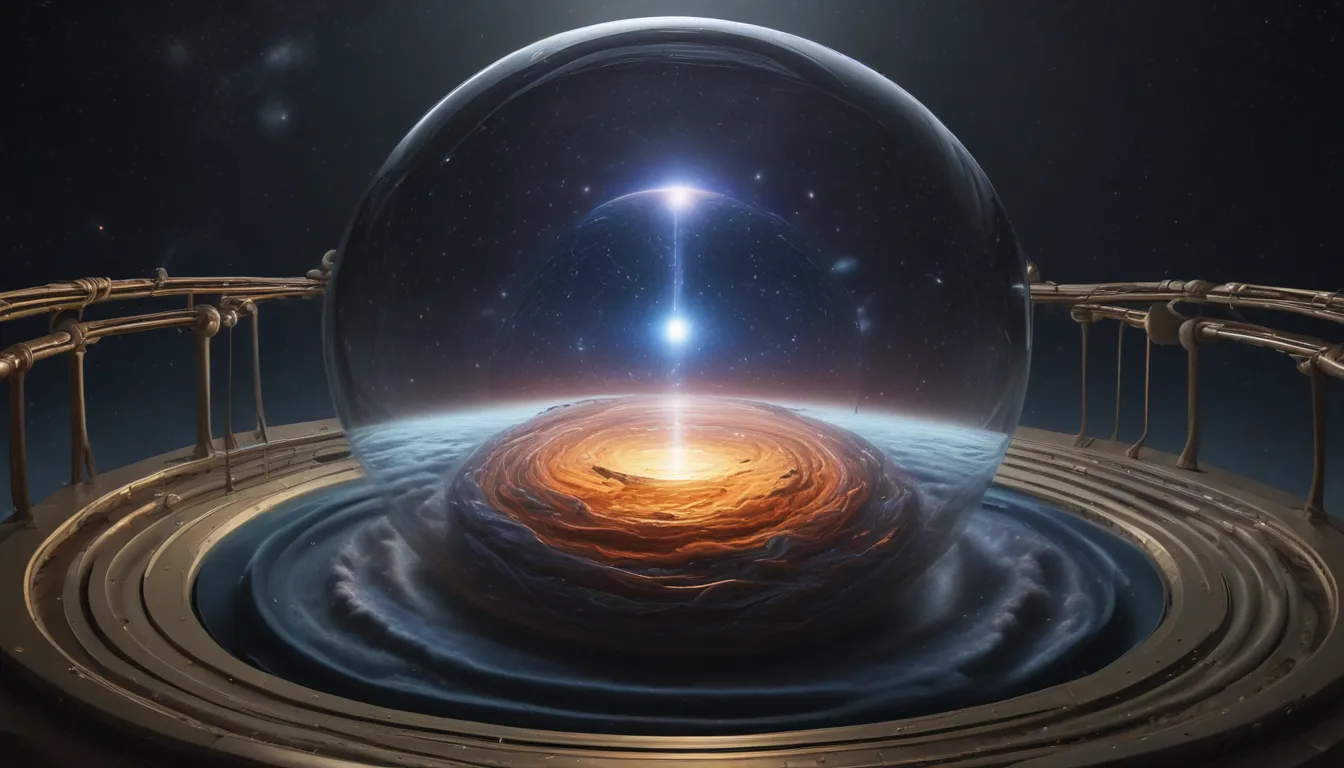A Note About Images: The images used in our articles are for illustration purposes only and may not exactly match the content. They are meant to engage readers, but the text should be relied upon for accurate information.
Welcome to the realm of gravitational force, a fundamental force that shapes the very fabric of our universe. In this article, we will journey through ten astonishing facts about gravitational force that will leave you in awe of its complexities and mysteries. From its role in governing the movements of celestial bodies to its influence on the structure of galaxies, gravitational force is a force to be reckoned with. Let’s dive into the fascinating world of gravity and deepen our understanding of this incredible force.
The Force Behind the Universe
Gravitational force, commonly known as gravity, is an essential force that governs the movements of celestial bodies in our universe. It keeps planets in their orbits, holds us firmly grounded on Earth, and shapes the structure of galaxies. Without gravity, the universe as we know it would cease to exist, highlighting the crucial role it plays in maintaining cosmic order.
The Universal Law of Gravitation
Sir Isaac Newton, a renowned physicist, formulated the universal law of gravitation in the late 17th century. According to this law, every particle of matter attracts every other particle with a force that is directly proportional to the product of their masses and inversely proportional to the square of their distance. This foundational principle laid the groundwork for our understanding of gravitational force and its effects on objects with mass.
Unraveling the Mystery: Gravitational Waves
In 2015, scientists confirmed the existence of gravitational waves, ushering in a new era of astrophysics. These ripples in the fabric of spacetime travel at the speed of light, offering a unique way to study cosmic events such as the collision of black holes and the merging of neutron stars. Gravitational waves provide valuable insights into the dynamic nature of the universe and continue to fuel scientific exploration and discovery.
The Power of Black Holes
Black holes, born from the collapse of massive stars, possess an unparalleled gravitational force. Their immense pull is so strong that not even light can escape beyond the event horizon, creating a cosmic abyss from which nothing can emerge. Black holes stand as a testament to the extraordinary power of gravitational force and the mysteries that lie within these enigmatic celestial entities.
Understanding Time and Space
Gravity not only influences objects in space but also shapes the very fabric of time and space itself. According to Einstein’s theory of general relativity, massive objects can cause a curvature in spacetime, leading to phenomena such as gravitational time dilation and gravitational lensing. These profound effects highlight the interconnectedness of gravity with the fundamental structure of the universe.
Gravitational Force and Tides
The gravitational force exerted by the moon and the sun plays a pivotal role in the formation of tides on Earth. This gravitational pull creates a tidal bulge on the side of our planet facing these celestial bodies, resulting in the ebb and flow of ocean waters. The tides serve as a tangible illustration of the influence of gravitational force on Earth’s natural phenomena.
The Equivalence Principle and General Relativity
Albert Einstein’s equivalence principle posits that the effects of gravity are indistinguishable from the effects of acceleration. This foundational concept forms the basis of Einstein’s theory of general relativity, which revolutionized our understanding of gravity and its implications for the nature of spacetime. General relativity stands as a cornerstone of modern physics, offering profound insights into the workings of the universe.
The Enigmatic Dark Energy
Scientists have discovered that the universe is expanding at an accelerating rate, a phenomenon that cannot be explained by traditional gravitational forces alone. This unexpected expansion has led to the hypothesis of dark energy, a mysterious component that makes up a significant portion of the universe’s energy content. Dark energy poses a fundamental challenge to our understanding of the cosmos, highlighting the ongoing quest to unravel its secrets.
Exploring the Depths of Gravitational Force
As we journey through the intricate realm of gravitational force, we encounter a tapestry of remarkable phenomena and profound mysteries that captivate the imagination. From the formation of galaxies to the emergence of black holes, gravity weaves a narrative of cosmic evolution that transcends the boundaries of space and time. Each discovery unveils a new layer of complexity and beauty, inviting us to explore the depths of gravitational force and uncover the wonders that lie beyond.
Conclusion: Embracing the Marvels of Gravitational Force
In conclusion, gravitational force stands as a cornerstone of our understanding of the universe, shaping the very essence of cosmic existence. These ten astonishing facts about gravity illuminate its remarkable properties and significance in the grand tapestry of the cosmos. From the pioneering insights of Newton to the groundbreaking theories of Einstein, gravitational force continues to inspire awe and curiosity, driving humanity’s quest to unravel the mysteries of the cosmos.
As we gaze upon the vast expanse of the universe, let us embrace the marvels of gravitational force and delve deeper into its intricacies. Each discovery, each revelation, brings us closer to unraveling the enigmatic forces that govern the cosmos, inviting us to expand our knowledge and appreciation of the wonders that surround us. So, embark on this journey through the captivating world of gravity and illuminate your mind with the awe-inspiring mysteries that await.
FAQs: Unveiling the Secrets of Gravitational Force
-
What is gravitational force?
Gravitational force is the attractive force between two objects with mass that governs the motion of celestial bodies and shapes the structure of the universe. -
How does gravitational force work?
Gravitational force operates based on the law of universal gravitation, which dictates that the force between two objects is proportional to their masses and inversely proportional to the square of the distance between them. -
Is there a difference between gravity and gravitational force?
Gravity and gravitational force are often used interchangeably to refer to the same phenomenon, namely the force that pulls objects towards each other due to their mass. -
Can gravitational force be measured?
Yes, gravitational force can be measured using a scale or by calculating the acceleration due to gravity using the formula F = m * g, where m is the mass and g is the acceleration due to gravity. -
Does the strength of gravitational force depend on distance?
Gravitational force weakens as the distance between objects increases, following an inverse square law where doubling the distance reduces the force to one-fourth of its original value. -
How does gravitational force shape the universe?
Gravitational force influences the formation and motion of galaxies, stars, and planets, playing a pivotal role in shaping the structure of the universe and driving cosmic evolution. -
Can gravitational force be canceled or neutralized?
In theory, it is possible to neutralize or cancel gravitational force, but doing so in practice requires advanced technologies and a deep understanding of gravity on a quantum level. -
Are there any phenomena caused by gravitational force?
Gravitational force leads to fascinating phenomena such as tides, orbital motion, and the bending of light, illustrating its profound influence on the dynamics of the cosmos. -
Can gravitational force be repulsive?
No, gravitational force is always attractive and pulls objects towards each other. Unlike electromagnetic forces, it does not exhibit repulsive behavior. -
Is there a limit to the strength of gravitational force?
There is no known limit to the strength of gravitational force, with its effects becoming extraordinarily intense in the vicinity of massive objects like black holes.
Delving Deeper into the Cosmos
As we conclude our exploration of gravitational force, we invite you to delve deeper into the mysteries and wonders of the cosmos. From the captivating interplay of celestial bodies to the profound effects of gravity on the fabric of spacetime, the universe offers a vast expanse of knowledge and discovery waiting to be unraveled. Embrace the curiosity within you, and embark on a journey through the enigmatic realms of gravitational force, where each revelation illuminates the intricacies of our cosmic existence. As we peer into the cosmic abyss, let us be inspired by the marvels that surround us and continue our quest to unlock the secrets of the universe one gravitational wave at a time.






